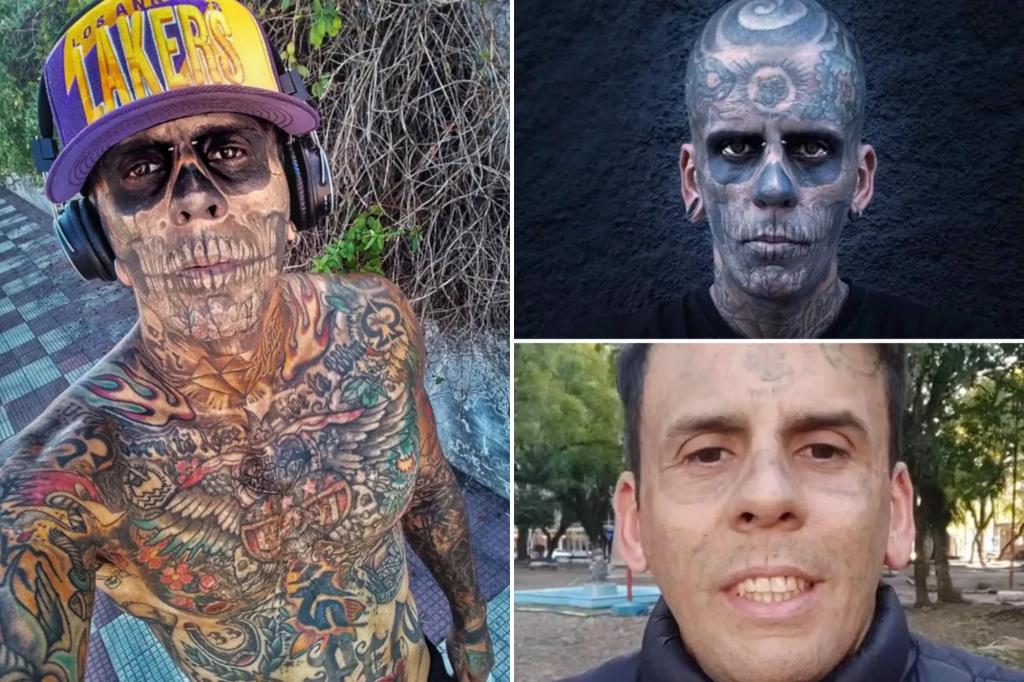A Life Rewritten: Brazil’s Former Most-Tattooed Man Erases His Past
Leandro de Souza’s life story is etched across his skin—or at least, it was. The 36-year-old photographer from Bagé in Brazil’s southernmost state once bore more than 170 tattoos covering approximately 95% of his body, an achievement that earned him the title of “most tattooed” at the 2023 Santa Rosa International Tattoo Expo. But today, de Souza is undertaking a painful journey in reverse, systematically erasing the very markings that once defined his public identity. This dramatic transformation began approximately two years ago following a profound religious conversion to evangelical Christianity. “I didn’t feel good, it didn’t suit me anymore,” he confessed to O Globo. “It was a world of excess, which no longer did me any good. There came a time when I felt like a circus attraction.” What began as artistic expression had eventually left him feeling like a spectacle rather than a person, trapped in an image that no longer reflected his evolving sense of self.
The decision to remove his tattoos represents far more than a cosmetic change—it symbolizes de Souza’s complete life overhaul. His embrace of Christianity coincided with a commitment to sobriety and a renewed focus on family responsibilities. Where once he was immersed in what he describes as a lifestyle of excess, he now strives for stability, working to maintain steady employment, pay child support, and regain guardianship of his elderly mother. The removal process itself has become a public journey, which de Souza documents on Instagram and through local media interviews. With each laser session, he sheds not just ink but also visual reminders of his former life. After completing his fifth facial treatment, he shared his gratitude online with a simple acknowledgment: “it’s about Jesus Christ.” This spiritual framing of his transformation suggests that for de Souza, the physical change mirrors an internal one—a realignment of his outer appearance with his newfound faith and values.
The pain of tattoo removal far exceeds that of getting inked in the first place, according to de Souza. “If you imagine that a person goes there to remove one from their finger and already complains of pain, imagine a session on the entire face, which involves three types of laser,” he told G1. Each session requires rigorous aftercare—icing, applying ointments, and exercising to support his body’s healing process. Despite the discomfort, he perseveres, having already completed five of the potentially eight sessions required just for his face. The remainder of his extensively tattooed body still awaits similar treatment. Throughout this ordeal, de Souza has received support from a São Paulo area tattoo studio that has offered their removal services pro bono. This generosity has made possible what would otherwise be a prohibitively expensive procedure, especially for someone working to rebuild their financial stability.
The studio partnering with de Souza frames his transformation as emblematic of deeper personal growth. “It’s important to remember: tattoos don’t define character,” they stated in a social media caption. “What transforms a life are choices, effort, and the determination to move forward. In this process, tattoo removal is merely a reflection of a much larger internal change that helps align the external image with the new identity being constructed.” They have also acknowledged that de Souza’s extensive tattoos coincided with a difficult period marked by addiction, homelessness, and incarceration—challenges he has since worked to overcome. This perspective offers a more nuanced understanding of de Souza’s journey, suggesting that the removal of his tattoos represents just one aspect of his broader rehabilitation and personal redemption.
De Souza’s story serves as a cautionary tale about the permanence of certain body modifications, particularly facial tattoos. “Think carefully before getting a face tattoo because I regret it,” he warned in an interview with CNN Brazil. He explained that his profession and connections once made tattoos easily accessible—and even profitable—for him. “I was in the tattoo business, and back then, I didn’t pay for these face tattoos. I got paid by the tattoo artist I worked with. And I regretted it.” This ease of access, combined with his immersion in tattoo culture, led him to decisions he would later reconsider. His experience highlights how circumstances, social environments, and life phases can influence choices with long-lasting consequences, especially when permanent body modifications are involved.
Despite his current efforts to remove his tattoos, de Souza maintains a nuanced stance on body art itself. “Today, I don’t tattoo. I don’t condemn tattoos,” he clarified. “I believe that, after baptism and conversion, there are more important things for us to do, my dear brothers.” His position reflects not a wholesale rejection of tattoos, but rather a shift in priorities following his religious conversion. As he progresses through his removal journey, de Souza regularly posts side-by-side comparisons showing the gradual fading of once-bold designs. These visual records chart not just the effectiveness of laser technology, but also the tangible evidence of his transformation. In sharing these images, he offers both documentation of an unusual physical process and testament to the possibility of profound personal change—a reminder that few decisions, even those made with permanent ink, need define us forever.


